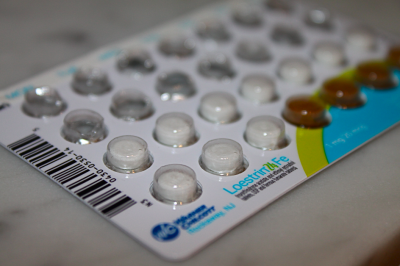Natasha Gabbay ’10
Web Managing Editor

Birth control was once used to do only what it suggests: control birth. Now, in a society where medical problems are cured by prescribing drugs, birth control is still used as a contraceptive, but has also expanded its purpose for a broader range of medical issues.
Staples students are taking advantage of it.
According to the Planned Parenthood website, “not only is the pill up to 99.7 percent affective against pregnancy, it’s got other health benefits– including less acne, fewer menstrual cramps, and more regular periods.”
The benefits of controlling menstruation appealed to one senior girl who said she went on the pill due to irregular periods. Although legally she could have obtained the birth control herself, the student was not embarrassed by her motives for going on birth control and told both of her parents. She added that even if she had not had an irregular period, her gynecologist would have wanted her to be on the Pill.
“My doctor said even if I didn’t have issues they would have put me on [birth control] before I went to college regardless.”
Another senior girl shared the issue of irregular periods, but also chose to go on the pill because she was becoming sexually active.
“I had an irregular period, and it just so happened it was when I started having sex.”
Although her dual reasoning may have been more private, she has now been on the pill for two years and said her parents knew that she was going on it for both issues. In fact, her mother supported her choice to go on the pill because they both felt it provided a safety net.
“I feel much more secure having sex while I’m on birth control. Also, my mom is a very fervent believer in the pill. She says it’s the only true protection while you’re having sex.”
Even if the pill does protect against most pregnancies, Planned Parenthood’s website states that “many women who take the pill also use condoms, because the pill offers no protection against sexually transmitted infections.”
While this information about sexually transmitted diseases is out there and is taught in health classes, one senior boy said he loved birth control because it allowed him to have sex with his girlfriend without a condom.
Another senior boy felt differently about birth control. His girlfriend was on it and he felt that there were too many drawbacks for a girl.
“I think that the negative side effects overshadow the positive intended purpose. Things like weight gain and mood swings are serious downsides.”
Both senior girls agreed that there were side effects. The one who has been on the pill for two years said she had to switch birth controls four times before she found one she was happy with. Some pills made her feel overly irritable, while others caused the irregularity of her period to become even worse.
With all the possible side effects, nurse Elizabeth Russ said that female students are “constantly” coming into the nurse’s office to ask questions about birth control.
“[Students] may have concerns about certain issues surrounding birth control, and there are added risks with birth control just as there are with any medicine you take.”
Russ highlighted that an issue for teens may be smoking cigarettes while on the pill. This combination significantly increases the risk of complications due to birth control usage.
Although the use of birth control tends to be a private subject, Russ said that the nurses would never judge a student for coming in with birth control related issues.
“[Using birth control] is a personal decision made between you–and hopefully-your parents, or any other trusted adult.”













































Mary Anne • Dec 4, 2009 at 2:33 am
Do a search on how the pill kills at http://www.all.org Then do some research on Natural Family Planning http://www.NFPoutreach.com, NFP International http://www.NFPandmore.org, The Couple to Couple League http://www.CCLI.org, and Family of the Americas familyplanning.net Mary Anne, Stopp Planned Parenthood of Southern New England Representative